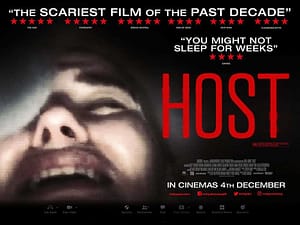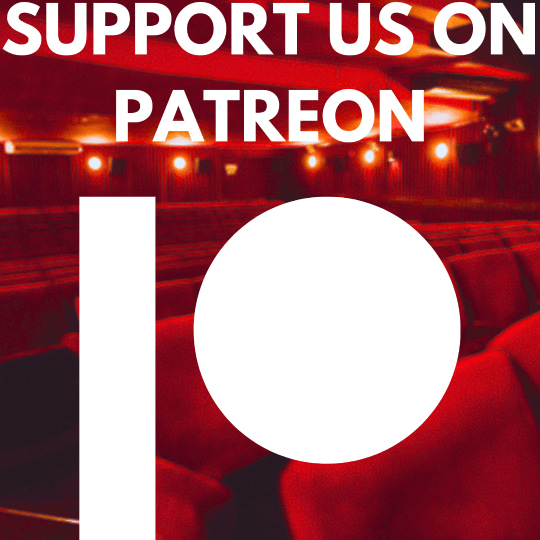 Of the many horrors we’ve all experienced throughout 2020 – and not just in the film genre – director Rob Savage’s lockdown fright-fest Host stood out as one of its crowning achievements.
Of the many horrors we’ve all experienced throughout 2020 – and not just in the film genre – director Rob Savage’s lockdown fright-fest Host stood out as one of its crowning achievements.
The British filmmaker, who conceived, shot, edited and submitted the Shudder Original horror film during an extremely tight 12-week deadline (all in the middle of a global pandemic, no less), has suddenly become an unexpected rising star of the genre, with critics and audiences responding so positively to his Zoom paranormal chiller that, as of publication, it still retains its initial 100% rating on Rotten Tomatoes, and even had a brief theatrical run late last year, before cinemas were forced to close once again.
It helps that the film itself is a real corker, genuinely frightening with strong performances and impressive DIY effects (which the actors set up and performed in their own homes, what with being in a lockdown and all), all while operating on a mere fraction of a budget reserved for more mainstream horror movies. The film also made Film Feeder’s end-of-year best list, for plenty of other reasons including the sheer amount of respect I have for Savage and his resilient cast and crew actually pulling all of this off while also coming out of it stronger than ever.
 To celebrate Host’s upcoming release on home media – including a rather nifty limited-edition Blu-ray with tons of special features and exclusive little art cards, available to pre-order now courtesy of Second Sight Films – I was extremely fortunate to catch with Rob Savage, who very kindly took time in the middle of working on his secret new project over at Blumhouse, and ask him a few burning questions about the extraordinary response of his film, and how it managed to come together as well as it did…
To celebrate Host’s upcoming release on home media – including a rather nifty limited-edition Blu-ray with tons of special features and exclusive little art cards, available to pre-order now courtesy of Second Sight Films – I was extremely fortunate to catch with Rob Savage, who very kindly took time in the middle of working on his secret new project over at Blumhouse, and ask him a few burning questions about the extraordinary response of his film, and how it managed to come together as well as it did…
[NOTE: Some parts of this interview have been slightly reworded or restructured for the purposes of being presentable in a written format]
First of all, congratulations on the film. It’s quite something to conceive, shoot, edit and submit any kind of film in such a short amount of time, let alone during a pandemic, but to have it also be a genuinely effective movie that’s taken the world by surprise is something else entirely. What was your initial reaction to your film being so warmly received by critics and audiences in the way that it was?
It was such a weird thing, because like you said it was made remotely during the lockdown, then it was released when we were in the same situation. It came out on streaming platforms, so everyone was watching it within their own homes, and without that kind of communal element of going to watch it in the cinema, seeing the audience’s reaction, feeling that energy in the room, it felt very surreal and very detached. The moment it really struck me was when, just after lockdown ended, we were able to get a few cinema screenings in, so people could actually go and experience it shoulder to shoulder – well, at a safe distance – with others. That was when it really hit me, and also to just go and experience it with the cast and crew who worked on it, because we’d achieved this thing together and we’d gotten this lovely recognition, but I still hadn’t seen them in months and months except on Zoom, so it was really nice to do that with them. That’s what it’s all about, just sharing the joy with the people you made it with, so I feel really lucky that we got to do that before we were plunged back into endless lockdown.
When you were initially coming up with the idea for the film, and how it would be presented via a Zoom call, how much did the initial lockdown back in March influence the kind of story you wanted to tell?
What we wanted to do was to make something that felt totally authentic to the moment and didn’t feel like a Hollywood-ised version of what was going on. I think we were very aware that on paper, making a movie on Zoom was a bad idea, and we could see the awful glossy version in our heads, so the only way we knew how to mitigate that was just to try and root everything by making sure it truly felt like the lives we are currently living. Everything kind of came from there, and I think having a great cast who were all friends in real life and were other people I was hanging out with on Zoom before we made the movie, it meant that we could say, “well, this doesn’t feel like when we’re hanging out, this feels manufactured, so let’s try and push it in a different direction.” It was a constant process of looking at the kind of fabric of lockdown, and trying to get that into the movie. We knew that if we could do that, then it would be a worthwhile endeavour.
Speaking of the cast, each and every actor in this delivers such a natural and genuine performance that it’s sometimes hard to remember they’re even acting at all. How did you go about choosing these people to play their fictional selves within the confides of their own homes?
It was really easy, because the way this project came together was that I pulled a prank on them via Zoom, which I filmed and put online, and then millions of people watched this video and shared it. It was the buzz of that which led to the making of Host, and all the people in that initial prank video are all the people in the film. The only one who wasn’t already in our friend group was Teddy [Linard], who we didn’t know at that point and only brought in later. It was really as simple as logging on to the next Zoom, hanging out and being like “Do you want to make a movie together, guys?” The nice thing was, there’s five of them which is a really good number of people, and they all have very distinct personalities which I knew how to get out of them. It wasn’t that usual process on a movie of having to figure out what that thing is about the actor that’s really going to make the character come to life, because I already knew that about them having known these people for years. I could already see the potential of that, and I think that’s why we were able to do it so fast: we started ahead, in that respect.
This is the kind of film that doesn’t feel like it belongs to one individual, but rather a group of people – actors, filmmakers, stunt performers – who came together to make a legitimately strong movie in lockdown. Was it important to you that this sense of community was active when you were all making this film?
Yeah, absolutely. Some people just like to try and take ownership, but really every movie is about the community of people you make it with. If it’s a good movie, it’s authored by a lot of different people, and I think with this film, making it remotely truly brought that into focus. We wouldn’t have been able to do this movie if the actors hadn’t really believed in it and wanted to go that extra mile by setting up the cameras themselves, doing their own special effects and all that stuff. The kind of ideas that you end up with by inviting that kind of collaboration, it can only be a benefit, and it’s something which I try and do on every movie and will try and do even more after Host, just to invite everyone I’m collaborating with to feel like they can throw in their ideas and say, “how about this?” or “I think this would be better.” It shouldn’t feel like a threat to filmmakers to collaborate with others, and I think it’s a real testament to a small group of people who all want the same thing, which is to make something that is really special. This new movie we’ve been making as well, we’ve been able to bring that ethos on, and again I feel that’s equally altered by this group of people who we’ve brought on to make it.
I’m glad you brought up your new movie, because since Host was released, you’ve begun working on some new projects with big Hollywood producers like Jason Blum over at Blumhouse. Given their extremely lucrative slate, how does it feel to be in the company of some of today’s most prolific horror filmmakers?
It’s incredible. Jason is one of the titans of the genre, and it’s both intimidating and fun to be a part of his enterprise. What’s really nice is that once you get past being starstruck and actually get down to making the movie, you start to see why these guys are really successful, because they really love what they do and they’re very collaborative. With this next movie that we’re doing, and the amount of control that was bestowed upon me to make the movie that I wanted to make, I don’t think anyone else would have given it, and in doing so that makes the collaborative process that much more enjoyable and productive. It’s just really nice to feel that by stepping up and working with these big producers, I don’t have to forego the kind of creativity process that worked so well on Host. That’s managed to stay intact, at least on this next movie.
Finally, this last year has been tough for all of us, especially the cinema industry which has seen major chains and independent outlets forced to close due to lockdowns and empty release schedules. Although your movie has benefited greatly from its online platforms, what are your thoughts on the theatrical experience and the overall importance of going to the cinema, as opposed to watching something at home?
I think it’s interesting, because I feel like there are two distinct experiences you have with watching Host. First, there’s the home experience, which is how a lot of people first saw it. What really surprised us when we released it is that people found it so scary, because I didn’t know if it was that scary of a movie, although I knew it was fun and that there were some surprising jumps in there. However, I never could have predicted it would take such a hold on people watching it on their own in lockdown on their laptops, creating a relationship with the movie that just makes it that little bit extra interactive, and it makes for a more intense experience. Meanwhile, in the cinema, it’s not as scary, but it is more fun, and I feel like that kind of communal, rollercoaster ride you go on with an audience is totally different, so it’s nice that you can experience the film in two different ways. For me, the reason to create is to feel a bond with someone else, so if you want to go and sit in a cinema with a bunch of strangers, and come out thinking “I felt exactly the same thing as a hundred people in that room, and in that moment we were all there on the edge of our seats,” that’s such an amazing thing, and that’s what you’re always thinking about when you’re creating these things. You can’t replicate that experience of watching it at home, but it’s different to be in a cinema, and I think that there’s benefits to both, which I feel this film has really shown as it plays differently in both situations.
Many thanks to Deb Murray over at Aim Publicity who set up this interview, and of course to Rob Savage himself for taking the time to answer these questions, and for also being a damn fine chap who I wish all the best of luck for in the future. You can follow him on Twitter @DirRobSavage and on Instagram @dirrobsavage!
Host: Limited Edition Blu-ray is released on 22nd February (pre-order by clicking here!)
Host is also available to stream exclusively on Shudder, or you can rent or buy it now on digital platforms, including Amazon Prime Video.
[the_ad id=”14415″]


